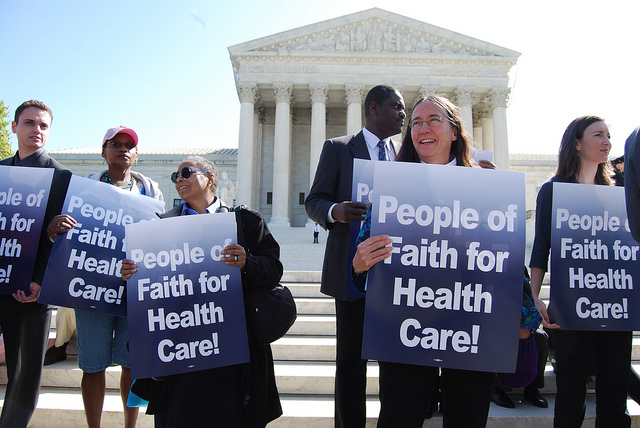Health Care Justice
The Church has always understood itself to be an extension of Jesus Christ’s ministry in the world. The diakonia of the early church — the ministry of healing, service, care, compassion and hospitality— served the needy neighbor in Christ. For more than thirty-five years the General Synod of the United Church of Christ has advocated for health care as a right and a priority for all people.
Traci Blackmon among clergy arrested in D.C. denouncing ‘sinful and immoral’ health care reform
Read more via UCC News and watch video clip of Rev. Blackmon’s remarks outside Senator Mitch McConnell’s office, prior to her arrest.
UCC Perspectives on Efforts to Repeal and Replace the ACA
- Will my child be uninsurable? by Chaplain Gunnar Cerda
- The Cost of this Nightmare by Mary Stainton
Ten priorities for a faithful health care system
As people of faith, we believe that any change, repeal, or repair of the Patient Protection and Affordable Care Act (ACA) must include comprehensive health care legislation in a single bill that
meets these ten priorities for a faithful health care system. These priorities arise from a shared commitment to a faith-inspired moral vision of a health care system that offers health, wholeness, and human dignity for all.
The scriptures of the Abrahamic traditions of Christians, Jews, and Muslims, as well as the sacred teachings of other faiths, understand that addressing the general welfare of the nation includes giving particular attention to people experiencing poverty or sickness. For their sake and for the common good, we must continue to make progress toward a U.S. health care system that is inclusive, equitable, affordable, accountable, and accessible for all.
- Preserve the coverage gains made by the ACA and further decrease the number of Americans without health insurance.
- Preserve the funding for Medicaid expansion and expand the program in all states.
- Ensure that reasonable revenue is in the federal budget to pay for health care for all.
- Uphold the purpose of Medicaid by refraining from structural changes to how the program is funded. Changing the funding structure to a block grant or per capita cap would impose rigid limits on the amount of federal money available to states for Medicaid, endangering the health and well-being of children, older adults, people with disabilities, and their families.
- Ensure that insurance premiums and cost sharing are truly affordable to all. Policies to improve affordability must prioritize those with the greatest need, not those with the means to put money in a health savings account or wait for tax deductions.
- Maintain health services and benefits currently provided by the ACA including access to essential medicines, mental health services, preventive services, pre-natal services, and other key services necessary to maintain health.
- Maintain guaranteed issue for those with pre-existing conditions. Do not quarantine the millions of Americans with pre-
existing conditions in unaffordable high risk insurance pools. - Prevent insurance companies from discriminating against women, the elderly, and people in poverty.
- Create effective mechanisms of accountability for insurance companies and not allow them to have annual or lifetime caps on expenditures.
- Continue to allow children under the age of 26 to be covered by their parents’ insurance.
(Excerpted from interfaith letter sent to Congress on March 7, 2017.)
Health Equity
Because of the Affordable Care Act (ACA), many Americans now have health care insurance that will assist them in gaining access to health services – a great first step. Unfortunately, many of those who have insurance face access challenges in finding, locating, and getting to a health provider to acquire appropriate care from the health care system in a timely manner.
Why are people struggling to attain quality care? Learn more about health Equity.
Just Eating
 The UCC Collegium of Officers invites and encourages all conferences, associations and congregations to participate and engage in dialogue and discussion using the Just Eating Curriculum.
The UCC Collegium of Officers invites and encourages all conferences, associations and congregations to participate and engage in dialogue and discussion using the Just Eating Curriculum.
This wonderful curriculum calls us to integrate the commitments and practices of our faith into the way we eat. We think it will be a great enhancement to your work around food justice and sustainability issues. Learn more.
